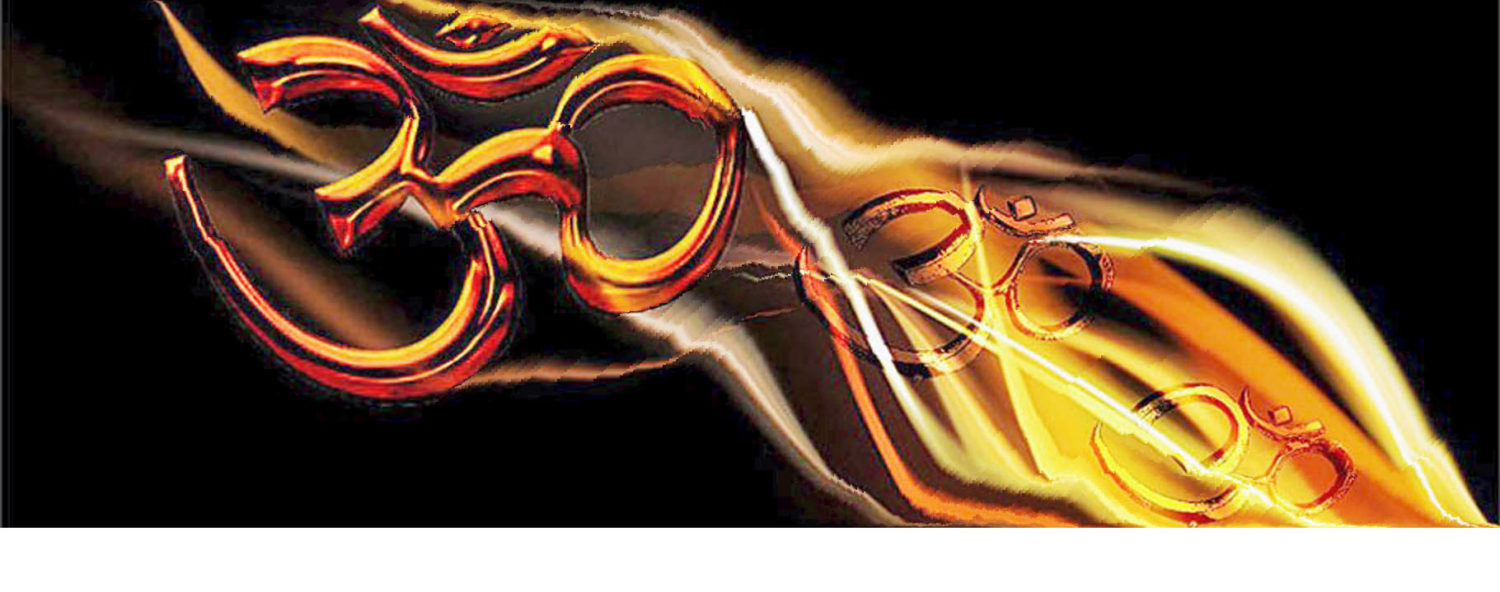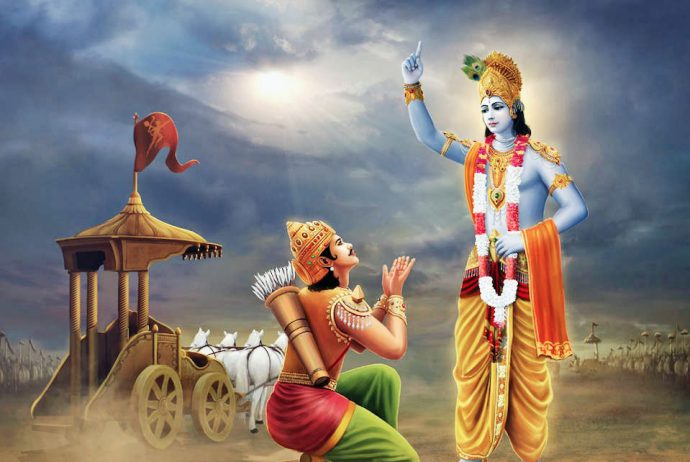Bhagavad Geeta Verses – Selected and Arranged by Sri Ramana Maharshi
Sri Ramana Maharshi often encouraged Devotees to study the Bhagavad Geeta. These verses may not come from the chapters in their numerical order, but they have been arranged by Ramana in the order of significance according to Him.
Sanskrit Verses and English Meaning
Item 1 : Chapter 2 – Verse 1
Sanjaya Uvaacha:
Tam tathaa kripayaavishtam ashrupoornaakulekshanam;
Visheedantam idam vaakyam uvaacha madhusoodanah.
Sanjaya said:
To him who was thus overcome with pity and compassion,
and who was despondent with despair, and with eyes full
of tears and was agitated, Madhusudana
(the destroyer of Madhu), spoke these words.
Item 2 : Chapter 13 – Verse 1
Sri Bhagavaan Uvaacha: Idam shareeram kaunteya kshetramityabhidheeyate;
Etadyo vetti tam praahuh kshetrajna iti tadvidah.
The Lord said:
This body, Oh Kaunteya, is called the Field; one who knows it
is called the Knower of the Field by the sages who know.
Item 3 : Chapter 13 – Verse 2
Kshetrajnam chaapi maam viddhi sarvakshetreshu bhaarata;
Kshetrakshetrajnayor jnaanam yattat jnaanam matam mama.
Know Me also as the Knower of the Field in all fields, Oh Bharata!
Knowledge of both the Field and the Knower of the Field
is deemed by Me to be true knowledge.
Item 4 : Chapter 10 – Verse 20
Ahamaatmaa gudaakesha sarvabhootaashayasthitah;
Ahamaadishcha madhyam cha bhootaanaamanta eva cha.
I am the Self, Oh Gudakesha, seated in the Hearts of all beings!
I am the beginning, the middle and also the end of all beings.
Item 5 : Chapter 2 – Verse 27
Jaatasya hi dhruvo mrityur dhruvam janma mritasya cha;
Tasmaad aparihaarye’rthe na twam shochitum arhasi.
Certain is death for the born and certain is birth for the dead;
therefore, for what no one can prevent, you should not grieve.
Item 6 : Chapter 2 – Verse 20
Na jaayate mriyate vaa kadaachin
Naayam bhootwaa bhavitaa vaa na bhooyah;
Ajo nityah shaashwato’yam puraano
Na hanyate hanyamaane shareere.
Never is He born nor does He ever die; after having been,
He again ceases not to be. Unborn, eternal, changeless
and ancient, He is not killed when the body is killed.
Item 7 : Chapter 2 – Verse 24
Acchedyo’yam adaahyo’yam akledyo’shoshya eva cha;
Nityah sarvagatah sthaanur achalo’yam sanaatanah.
This Self cannot be cut, burnt, made wet nor dried up.
It is eternal, all-pervading, stable, ancient and immovable.
Item 8 : Chapter 2 – Verse 17
Avinaashi tu tad viddhi yena sarvam idam tatam;
Vinaasham avyayasyaasya na kashchit kartum arhati.
Know That to be indestructible, by whom all this is pervaded.
None can cause the destruction of That, the Imperishable.
Item 9 : Chapter 2 – Verse 16
Naasato vidyate bhaavo naabhaavo vidyate satah;
Ubhayorapi drishto’ntastwanayos tattwadarshibhih.
The unreal hath no being; there is no non-being of the Real;
the truth about both has been seen by the knowers of the Truth
(or the seers of the Reality).
Item 10 : Chapter 13 – Verse 33
Yathaa sarvagatam saukshmyaadaakaasham nopalipyate;
Sarvatraavasthito dehe tathaatmaa nopalipyate.
As the all-pervading ether is not tainted because of its subtlety,
so the Self seated everywhere in the body, is not tainted.
Item 11 : Chapter 15 – Verse 6
Na tadbhaasayate sooryo na shashaangko na paavakah;
Yadgatwaa na nivartante taddhaama paramam mama.
Neither the sun nor the moon nor fire illumines It;
and where having gone they return not; that is My Supreme Abode.
Item 12 : Chapter 8 – Verse 21
Avyakto’kshara ityuktastamaahuh paramaam gatim;
Yam praapya na nivartante taddhaama paramam mama.
What is called the Unmanifested and the Imperishable,
That they say is the highest goal (path). Those who reach It
do not return to this cycle of births and deaths.
That is My highest abode (place or state).
Item 13 : Chapter 15 – Verse 5
Nirmaanamohaa jitasangadoshaa Adhyaatmanityaa vinivrittakaamaah;
Dwandwairvimuktaah sukhaduhkhasamjnair Gacchantyamoodhaah padamavyayam tat.
Without pride, without delusion, victorious over the evil of attachment,
dwelling constantly in the Self, their desires completely abandoned,
freed from the pairs of opposites known as pleasure and pain,
the undeluded reach the eternal goal, the Immutable Abode.
Item 14 : Chapter 16 – Verse 23
Yah shaastravidhimutsrijya vartate kaamakaaratah;
Na sa siddhimavaapnoti na sukham na paraam gatim.
He who, casting aside the ordinances of the scriptures,
acts under the impulse of desire, attains neither perfection
nor happiness nor the supreme state.
Item 15 : Chapter 13 – Verse 28
Samam sarveshu bhooteshu tishthantam parameshwaram;
Vinashyatswavinashyantam yah pashyati sa pashyati.
He sees, who sees the Supreme Lord, existing equally
in all beings, the unperishing within the perishing.
Item 16 : Chapter 11 – Verse 54
Bhaktyaa twananyayaa shakyam aham evamvidho’rjuna;
Jnaatum drashtum cha tattwena praveshtum cha parantapa.
But by devotion alone, without the “otherness”,
can I be known in this form, and seen, and in reality
entered into, Oh Parantapa!
Item 17 : Chapter 17 – Verse 3
Sattwaanuroopaa sarvasya shraddhaa bhavati bhaarata;
Shraddhaamayo’yam purusho yo yacchraddhah sa eva sah.
The faith of each is in accordance with his nature, Oh Bharata!
The man consists of his faith; as a man’s faith is, so is he.
Item 18 : Chapter 4 – Verse 39
Shraddhaavaan labhate jnaanam tatparah samyatendriyah;
Jnaanam labdhvaa paraam shaantim achirenaadhigacchati.
The man who is full of faith, who is devoted to it,
and who has controlled all the senses gains knowledge;
and, having obtained the knowledge,
he swiftly attains Supreme Peace.
Item 19 : Chapter 10 – Verse 10
Teshaam satatayuktaanaam bhajataam preetipoorvakam;
Dadaami buddhiyogam tam yena maamupayaanti te.
To them who are ever steadfast, worshipping Me with love,
I give them the union with the intellect by which they come to Me.
Item 20 : Chapter 10 – Verse 11
Teshaam evaanukampaartham aham ajnaanajam tamah;
Naashayaamyaatmabhaavastho jnaanadeepena bhaaswataa.
Out of mere compassion for them, dwelling within their Self,
I destroy the darkness born of ignorance by the luminous lamp of knowledge.
Item 21 : Chapter 5 – Verse 16
Jnaanena tu tad ajnaanam yeshaam naashitam aatmanah;
Teshaam aadityavaj jnaanam prakaashayati tatparam.
But to those whose ignorance is destroyed by knowledge of the Self,
knowledge illumines the Supreme (Brahman) like the sun.
Item 22 : Chapter 3 – Verse 42
Indriyaani paraanyaahur indriyebhyah param manah;
Manasastu paraa buddhir yo buddheh paratastu sah.
They say that the senses are superior;
superior to the senses is the mind;
superior to the mind is the intellect;
and one who is superior even to the intellect
Is He, the Self.
Item 23 : Chapter 3 – Verse 43
Evam buddheh param buddhwaa samstabhyaatmaanam aatmanaa;
Jahi shatrum mahaabaaho kaamaroopam duraasadam.
Thus, knowing Him to be superior to the intellect
and restraining the self by the Self, Oh mighty-armed Arjuna,
slay the enemy in the form of desire, hard to conquer!
Item 24 : Chapter 4 – Verse 37
Yathaidhaamsi samiddho’gnir bhasmasaat kurute’rjuna;
Jnaanaagnih sarvakarmaani bhasmasaat kurute tathaa.
As the blazing fire reduces fuel to ashes, Oh Arjuna,
so does the fire of knowledge reduce all actions to ashes!
Item 25 : Chapter 4 – Verse 19
Yasya sarve samaarambhaah kaamasankalpa varjitaah;
Jnaanaagni dagdhakarmaanam tam aahuh panditam budhaah.
He whose undertakings are all devoid of desires
and selfish purposes, and whose actions have been burnt
by the fire of knowledge, Him the wise call a sage.
Item 26 : Chapter 5 – Verse 26
Kaamakrodhaviyuktaanaam yateenaam yatachetasaam;
Abhito brahma nirvaanam vartate viditaatmanaam.
Perfect Peace and Bliss radiates on all sides
for those self-controlled ascetics who are free
from desire and anger, who have controlled their
mind and who have realised the Real Self.
Item 27 : Chapter 6 – Verse 25
Shanaih shanairuparamed buddhyaa dhritigriheetayaa;
Aatmasamstham manah kritwaa na kinchidapi chintayet.
Little by little one should attain quietude and tranquillity
by the intellect held firmly; having made the mind establish
itself in the Self, let him not think of anything at all.
Item 28 : Chapter 6 – Verse 26
Yato yato nishcharati manashchanchalamasthiram;
Tatastato niyamyaitad aatmanyeva vasham nayet.
From whatever cause the restless, unsteady mind
wanders away, from that let him restrain it and
bring it under the control of the Self alone.
Item 29 : Chapter 5 – Verse 28
Yatendriya manobuddhir munir mokshaparaayanah;
Vigatecchaabhaya krodho yah sadaa mukta eva sah.
With the senses, the mind and the intellect always
controlled, having liberation as his supreme goal
one who devoutly seeks Liberation, free from desire,
fear and anger, that sage is certainly liberated for ever.
Item 30 : Chapter 6 – Verse 29
Sarvabhootasthamaatmaanam sarvabhootaani chaatmani;
Eekshate yogayuktaatmaa sarvatra samadarshanah.
With the mind harmonised by Yoga (union of the mind
with the Pure Self) he impartially sees the Self
abiding in all beings and all beings in the Self;
he sees the same everywhere.
Item 31 : Chapter 9 – Verse 22
Ananyaashchintayanto maam ye janaah paryupaasate;
Teshaam nityaabhiyuktaanaam yogakshemam vahaamyaham.
Those who worship Me and meditate on me alone, without
“otherness” thinking on me alone, ever united with me in mind,
I secure and protect their welfare.
Item 32 : Chapter 7 – Verse 17
Teshaam jnaanee nityayukta eka bhaktirvishishyate;
Priyo hi jnaanino’tyarthamaham sa cha mama priyah.
Of them, the wise Jnani, ever steadfast and devoted
to the One, excels (is the best); for, I am exceedingly
dear to the wise one and he is dear to Me.
Item 33 : Chapter 7 – Verse 19
Bahoonaam janmanaamante jnaanavaanmaam prapadyate;
Vaasudevah sarvamiti sa mahaatmaa sudurlabhah.
At the end of many births the wise Jnani finds refuge in Me,
realising that all this is Vasudeva (the innermost Self);
such a great soul (Mahatma) is very hard to find.
Item 34 : Chapter 2 – Verse 55
Prajahaati yadaa kaamaan sarvaan paartha manogataan;
Aatmanyevaatmanaa tushtah sthitaprajnastadochyate.
When a man completely casts off all the desires
of the mind, Oh Partha, and is satisfied in the Self
by the Self, then is he said to be one of steady wisdom.
Item 35 : Chapter 2 – Verse 71
Vihaaya kaamaan yah sarvaan pumaamshcharati nihsprihah;
Nirmamo nirahankaarah sa shaantim adhigacchati.
Abandoning all desires, one who moves about without
longing, without the sense of mine and without egoism,
He attains Peace of Mind.
Item 36 : Chapter 12 – Verse 15
Yasmaannodwijate loko lokaannodwijate cha yah;
Harshaamarshabhayodwegairmukto yah sa cha me priyah.
He by whom the world is not disturbed and who cannot
be disturbed by the world, and who is freed from excitement,
envy, fear and anxiety — he is dear to Me.
Item 37 : Chapter 14 – Verse 25
Maanaapamaanayostulyas tulyo mitraaripakshayoh;
Sarvaarambhaparityaagee gunaateetah sa uchyate.
The same in honour and dishonour, the same to friend and foe,
abandoning all egotistical undertakings – he is said to have
transcended the three Gunas.
Item 38 : Chapter 3 – Verse 17
Yastwaatmaratir eva syaad aatmatriptashcha maanavah;
Aatmanyeva cha santushtas tasya kaaryam na vidyate.
For one who rejoices and revels only in the Self,
who is satisfied in the Self alone, who is content
in the Self alone, for him really there is no work to do.
Item 39 : Chapter 3 – Verse 18
Naiva tasya kritenaartho naakriteneha kashchana;
Na chaasya sarvabhooteshu kashchidartha vyapaashrayah.
For him there is no interest or purpose whatsoever
in all the beings in what is done or what is not done;
nor does he depend on any being for any object.
Item 40 : Chapter 4 – Verse 22
Yadricchaalaabhasantushto dwandwaateeto vimatsarah;
Samah siddhaavasiddhau cha kritwaapi na nibadhyate.
Content with what comes to him without effort
by chance, having transcended the pairs of
opposites and envy, even-minded in success
and failure, though acting, he is not bound.
Item 41 : Chapter 18 – Verse 61
Eeshwarah sarvabhootaanaam hriddeshe’rjuna tishthati;
Bhraamayan sarvabhootaani yantraaroodhaani maayayaa.
The Lord dwells in the hearts of all beings, Oh Arjuna,
causing all beings, by His mysterious power,
to revolve as if mounted on a machine!
Item 42 : Chapter 18 – Verse 62
Tameva sharanam gaccha sarvabhaavena bhaarata;
Tatprasaadaatparaam shaantim sthaanam praapsyasi shaashwatam.
Surrender only to Him, Oh Bharata! Take refuge in Him
with all thy being. By His Grace you shall obtain
Supreme Peace and Eternal Abode.
Thus shines the quintessence of the Bhagavad Geeta consisting of
the verses selected by Bhagavan Sri Ramana Maharshi. One who
studies these forty two verses with earnestness and devotion
easily attains the knowledge imparted by the complete Bhagavad Geeta.




